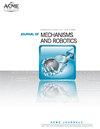Design and Analysis of a Novel Redundant Parallel Mechanism for Long Bone Fracture Reduction
IF 2.2
4区 计算机科学
Q2 ENGINEERING, MECHANICAL
Journal of Mechanisms and Robotics-Transactions of the Asme
Pub Date : 2023-11-02
DOI:10.1115/1.4063981
引用次数: 0
Abstract
Abstract In recent years, parallel robots have become a hot research topic in trauma fracture treatment because of their high precision, high load capacity, and compact structure. However, compared with serial robots, parallel robots have disadvantages like smaller workspaces and more complex dexterity. In this paper, a novel redundant parallel mechanism (RPM) for long bone fracture reduction is proposed based on Stewart parallel mechanism (SPM). 6 kinematically redundant DOFs (Degrees of freedom) are added to the RPM. First, the kinematics of the RPM is established, and its workspace is calculated. The analysis results indicate that the position workspace of the RPM is about 19 times larger than that of the SPM. The RPM has a similar range of torsion angles as the SPM, but a more extensive range of tilt angles than the SPM. Second, the singularities of the two parallel mechanisms are compared based on the dimensionally homogeneous Jacobian matrix. The results show that the dexterity of the RPM is much better than the SPM. Third, a multi-parameter multi-objective optimization method is proposed to optimize the geometry parameters of the RPM. The statics of the RPM is analyzed by finite element analysis. To further expand the performance of the RPM, the unfixed RPM (URPM) is proposed. The analysis results show that the URPM is superior to the RPM in terms of workspace and dexterity. Finally, experiments are conducted to verify the effectiveness of the proposed methods in this paper.一种新型冗余并联长骨骨折复位机构设计与分析
近年来,并联机器人以其精度高、承载能力强、结构紧凑等优点成为创伤骨折治疗领域的研究热点。然而,与串联机器人相比,并联机器人存在工作空间小、灵巧性复杂等缺点。基于Stewart并联机构(SPM),提出了一种用于长骨骨折复位的冗余并联机构。6个运动冗余自由度(自由度)被添加到RPM。首先,建立RPM的运动学模型,计算其工作空间;分析结果表明,RPM的位置工作空间约为SPM的19倍。RPM具有与SPM相似的扭转角范围,但倾斜角范围比SPM更广。其次,基于齐次雅可比矩阵,比较了两种并联机构的奇异性;结果表明,RPM的灵巧性明显优于SPM。第三,提出了一种多参数多目标优化方法,对转速的几何参数进行优化。采用有限元方法对转矩器的静力学进行了分析。为了进一步扩展RPM的性能,提出了不固定RPM (unfixed RPM, URPM)。分析结果表明,URPM在工作空间和灵巧性方面优于RPM。最后,通过实验验证了本文方法的有效性。
本文章由计算机程序翻译,如有差异,请以英文原文为准。
求助全文
约1分钟内获得全文
求助全文
来源期刊

Journal of Mechanisms and Robotics-Transactions of the Asme
ENGINEERING, MECHANICAL-ROBOTICS
CiteScore
5.60
自引率
15.40%
发文量
131
审稿时长
4.5 months
期刊介绍:
Fundamental theory, algorithms, design, manufacture, and experimental validation for mechanisms and robots; Theoretical and applied kinematics; Mechanism synthesis and design; Analysis and design of robot manipulators, hands and legs, soft robotics, compliant mechanisms, origami and folded robots, printed robots, and haptic devices; Novel fabrication; Actuation and control techniques for mechanisms and robotics; Bio-inspired approaches to mechanism and robot design; Mechanics and design of micro- and nano-scale devices.
 求助内容:
求助内容: 应助结果提醒方式:
应助结果提醒方式:


